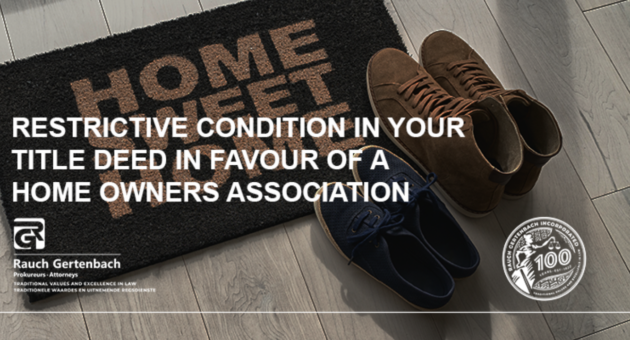When a township development is approved by a municipality, a statutory condition is usually imposed that the developer must establish a Home Owners Association (hereinafter referred to as “HOA”) and subsequently an HOA condition is created in the title deeds of the properties in the development. These restrictive conditions often include that the owner of the property is bound by the constitution of the HOA; that they shall be a member of the HOA once the property is transferred to them and; that the property may not subsequently be transferred without first obtaining written consent from the HOA confirming that all levies and any other amounts due is paid up to date. This is seen as a restrictive condition and is registered against the title deeds of the respective properties.
It is common that disputes arise regarding the enforceability of restrictive conditions contained in a title deed in favour of an HOA. Developers and homeowners tend to show resistance to the conditions imposed in favour of an HOA due to the misunderstanding regarding lawful enforcement of such conditions once a new township has been established and registered. Developers and homeowners refuse being a member of the HOA despite the registration of the restrictive condition in their title deeds.
In Koka NO and Others v Willow Waters Home Owners’ Association (Pty) Ltd and Others [2013] the High Court ruled that the restrictive condition imposed in favour of the HOA was a personal right and the fact that it was registered against the title deed does not transform the condition to a real right. This decision was set aside by the Supreme Court of Appeal which found that the registration of this condition in the Deeds Office converted the personal right to a real right which is enforceable against any and all holders of the title deed. A real right is effectively protected by its registration in the Deeds Office and therefor enforceable against the holders of said title deeds.
In some instances the condition in favour of the HOA can mistakenly be omitted from a title deed. This does not mean an owner of that property is not bound by the terms of the HOA and this error can simply be amended to include the condition in the title deed upon application to the Registrar of Deeds.
It is thus of paramount importance that if your property is situated, or you intend to purchase a property situated in a township or development with an HOA you should read and know the contents of the constitution or articles of association of the HOA and be aware that on transfer of the property into your name, you become a member of the said HOA and will be bound by the terms and conditions.
For more information, kindly contact Lorandi van der Merwe at 044 601 9900 or lorandi@rgprok.com. www.rgprok.co.za .







